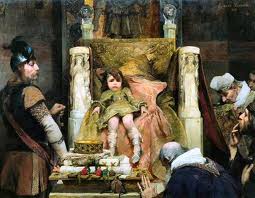 This blog started as an appreciation on the amazing era called so wrongly the Dark Ages. Starting from 451 AD (not at the Fall of the Roman Empire as this notion is quite depressing, but at the Birth of a Nation, France as the Battle of the Catalaunian Plains which saw Attila been defeated by some sort of band of Frankish, Gaul and Roman brothers) this will very arbitrarily endsup in 711 AD. Date where roughly the Merovingian dynasty enters extinction, the British Isles are nominally all Christian and Spain but for Asturias is under the Rule of the Al Andalus Emirs.
This blog started as an appreciation on the amazing era called so wrongly the Dark Ages. Starting from 451 AD (not at the Fall of the Roman Empire as this notion is quite depressing, but at the Birth of a Nation, France as the Battle of the Catalaunian Plains which saw Attila been defeated by some sort of band of Frankish, Gaul and Roman brothers) this will very arbitrarily endsup in 711 AD. Date where roughly the Merovingian dynasty enters extinction, the British Isles are nominally all Christian and Spain but for Asturias is under the Rule of the Al Andalus Emirs.
To say that I am an humble fan of everything Dark Ages is but the understatement of the Century. All my friends have heard of the Staffordshire Hoard, been taken to lost villages to hear me sing songs of praises in front of a derelict Saxon wall and expect my grandson to be named after the Venerable Bede.
And I must admit to a partiality for Norse Gods. None the less, @morangles will bodly go to where loads of people have gone before: write about the Dark Ages.
I have been living with this story in my head since the past three years and I have completed the first chapter of the second part/book of this Early Anglo-Saxon story.
I love my characters. Guess what: no villain. Or some but not in Bede though in Gregory… there are plenty of bad guys and evil Queens.
Bede the Northumbrian or rather NorthHymbrian monk who never left his monastery in Jarrow, was a brilliant scientist and Gregory of Tours a posh well travelled courtier. My guys. Both writers became curiously Saints. You cannot imagine two men this more different. Yet all we know from this era rely mainly on their quills. We need both point of view: The imperious eye of the Bishop certainly not duped by the sanctimonous tale of the bloodline of Chlodovecus and the naive vision of the peaceful monk when it came to read kings imperatives.
Because tell me what is common because the Englisc priest and the aristocratic bishop who was fawning on King Gunthramm. Nothing but the will to share what they heard or witnessed from past events. They should be the Saint Patrons for Journalists and Historians.
My next entry may be the said first chapter.
Kent. 616 AD…